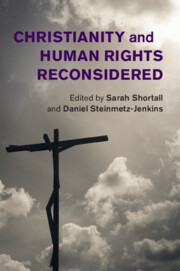Book contents
- Christianity and Human Rights Reconsidered
- Human Rights in History
- Christianity and Human Rights Reconsidered
- Copyright page
- Contents
- Figures
- Contributors
- Preface
- Acknowledgments
- Introduction
- Part I General Reflections
- Part II European Catholicism and Human Rights
- 3 Explaining the Catholic Turn to Rights in the 1930s
- 4 Catholic Social Doctrine and Human Rights
- 5 Radical Orthodoxy and the Rebirth of Christian Opposition to Human Rights
- 6 The Biopolitics of Dignity
- Part III American Protestant Trajectories
- Part IV Beyond Europe and North America
- Index
4 - Catholic Social Doctrine and Human Rights
From Rejection to Endorsement?
from Part II - European Catholicism and Human Rights
Published online by Cambridge University Press: 26 September 2020
- Christianity and Human Rights Reconsidered
- Human Rights in History
- Christianity and Human Rights Reconsidered
- Copyright page
- Contents
- Figures
- Contributors
- Preface
- Acknowledgments
- Introduction
- Part I General Reflections
- Part II European Catholicism and Human Rights
- 3 Explaining the Catholic Turn to Rights in the 1930s
- 4 Catholic Social Doctrine and Human Rights
- 5 Radical Orthodoxy and the Rebirth of Christian Opposition to Human Rights
- 6 The Biopolitics of Dignity
- Part III American Protestant Trajectories
- Part IV Beyond Europe and North America
- Index
Summary
This chapter examines the evolution of Catholic social doctrine on the topic of human rights. Its purpose is to explain how official Catholic doctrine moved from an initial rejection of such rights throughout the nineteenth and early twentieth centuries to an ostensible endorsement of them in the second half of the twentieth century. The argument advanced is that the Church effectively co-opted human rights by transforming the meaning historically assigned to them. Whereas such rights were originally construed as expressions of an “individualist” and “contractualist” social philosophy ultimately founded on the idea of human autonomy, over the course of the past half-century the Church has progressively restyled them as correlates of a “neo-Thomistic” idea of natural law. In this way it has been able to endorse human rights without relinquishing any of the foundational principles of its critique of modernity.
- Type
- Chapter
- Information
- Christianity and Human Rights Reconsidered , pp. 81 - 102Publisher: Cambridge University PressPrint publication year: 2020

